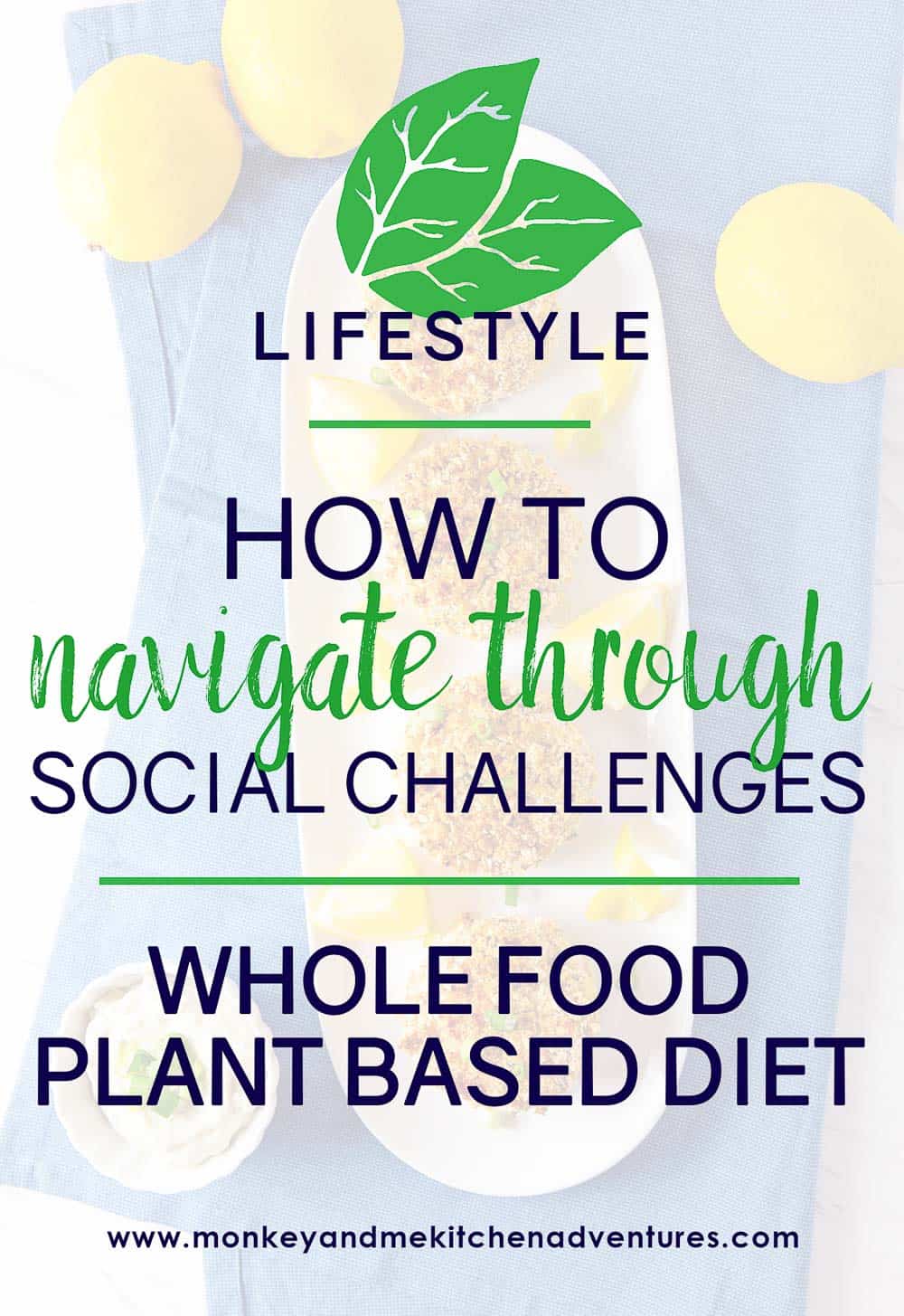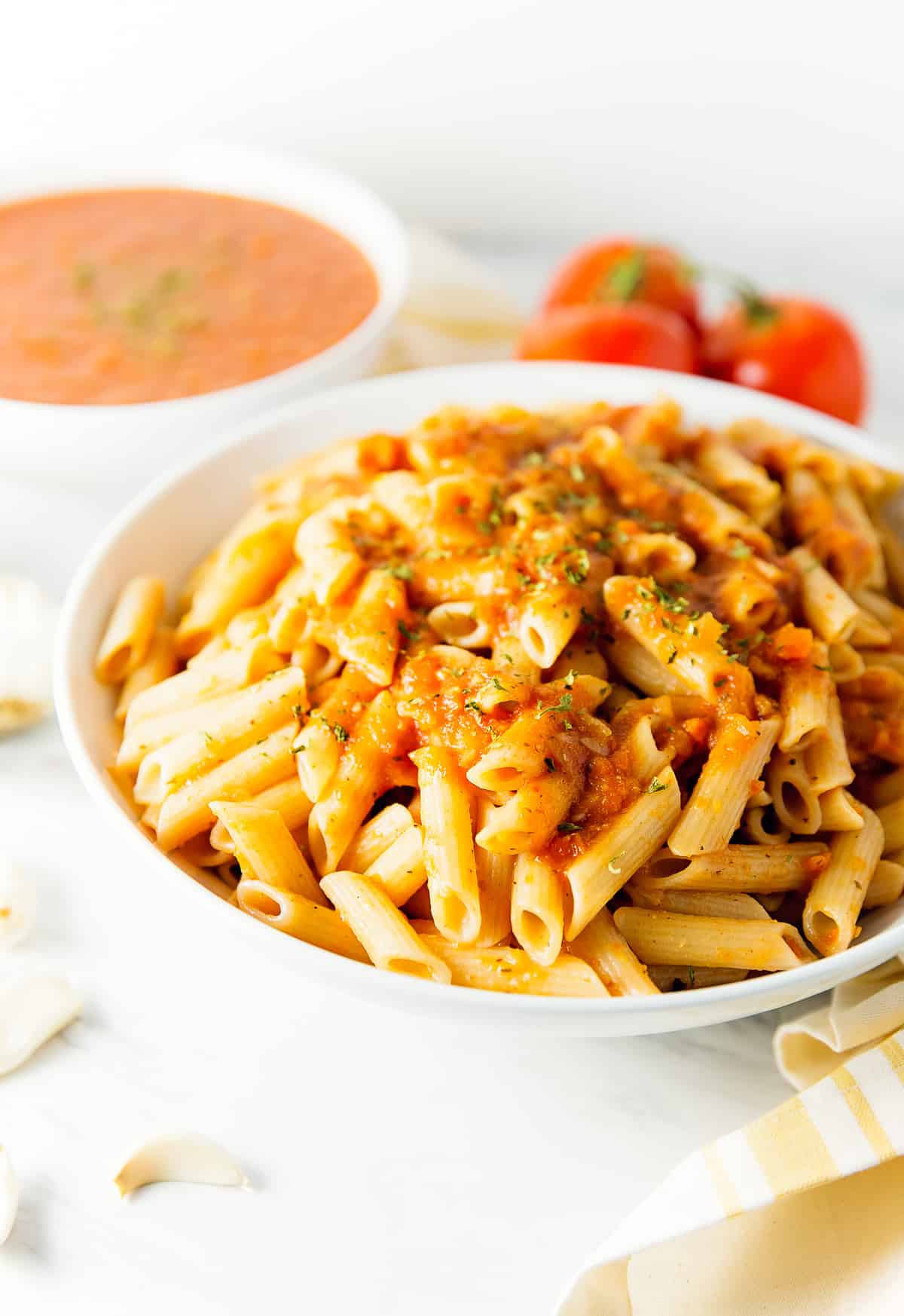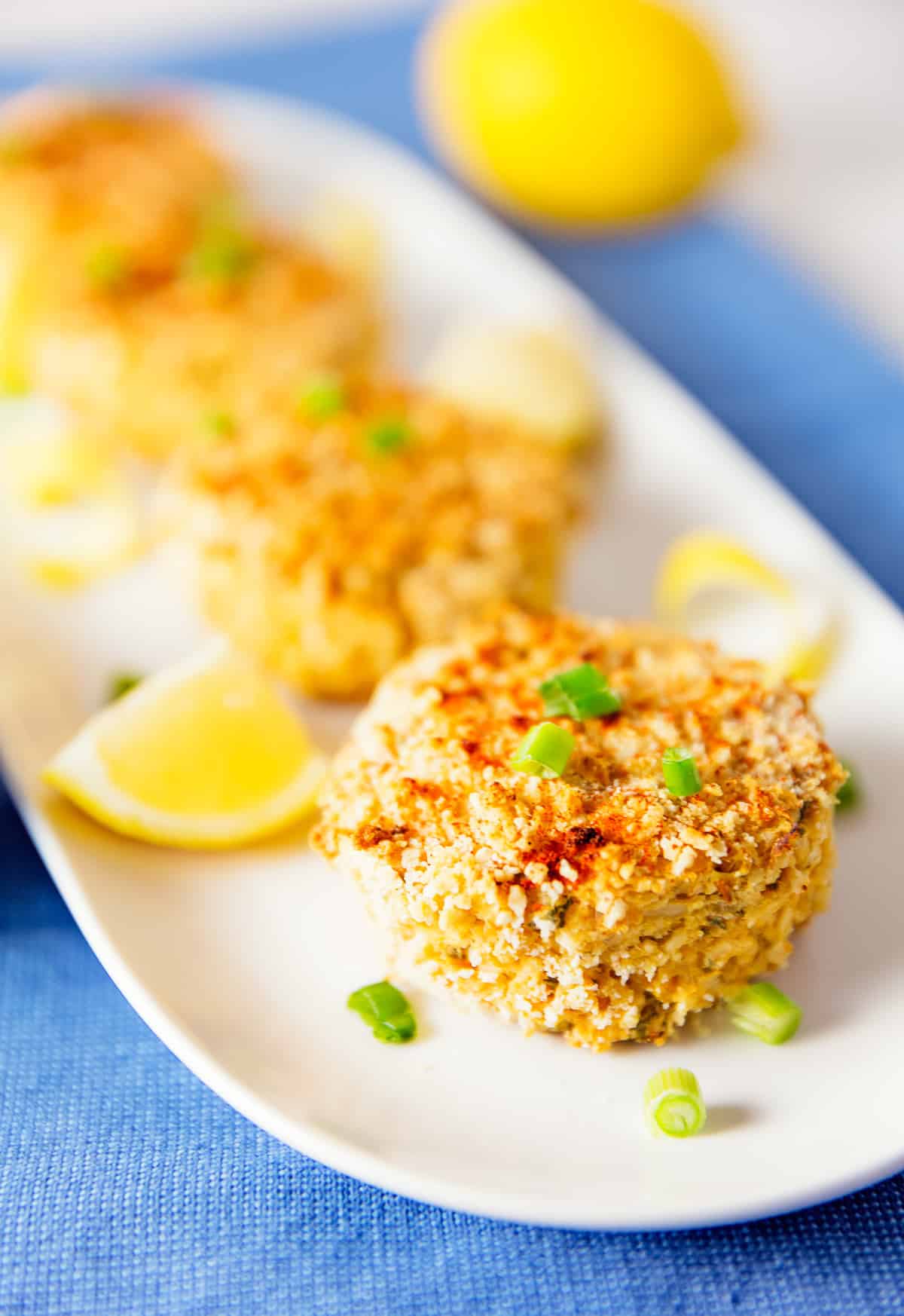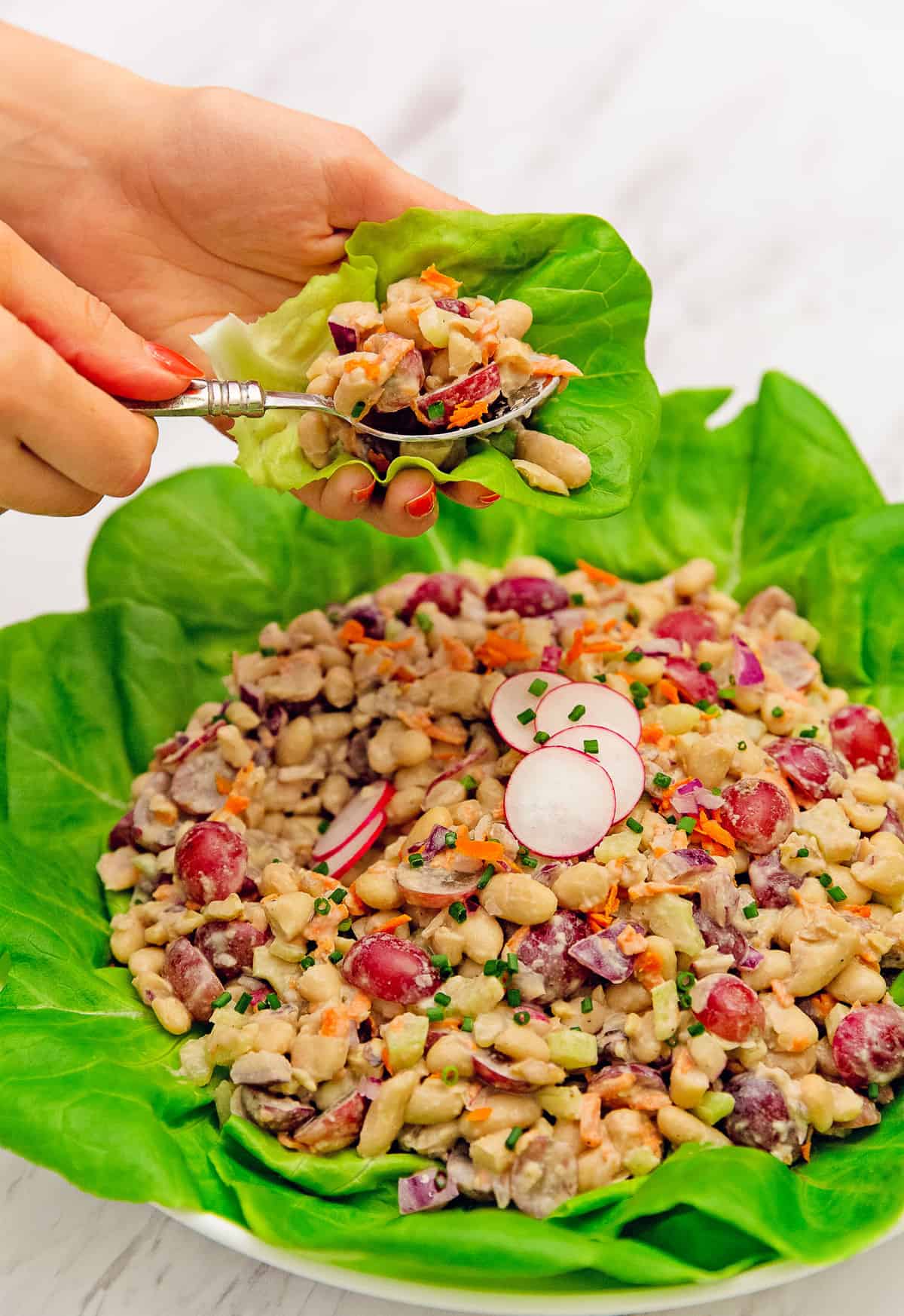
When we first became Whole Food Plant Based, we wanted to share our new lifestyle with everyone! We felt great and wanted all our friends and family to experience it too!
Not everyone transitioning to Whole Food Plant Based lifestyle will have negative or challenging social experiences. We are very fortunate to have a supportive family. And we were eager to share all that we have learned.
It’s like when you just finished reading an amazing book that really opened your mind and you want to tell people all about it. Or perhaps, you just watched a really thought provoking movie or documentary, like “What the Health”, and you just can’t wait to talk about it with the people who are close to you. You want to share. AND sharing is caring after all, right? Well, not always.
Unfortunately, not everyone is as happy and supportive as you make your transition to a Whole Food Plant Based lifestyle. They may not understand, and they may not like this new change. This post is for those who have experienced or are experiencing challenges with friends and family. We want to share and provide you with some tips and ideas on how to negate/avoid hurtful arguments that we have found helpful.
If you live in a Western based culture, then you are fully aware of just how bad the Western diet is for you and your family. The majority of the food eaten is unhealthy. More than likely the long term adverse health impacts of the Western diet are the very reason you have decided to go WFPB.
Just remember, not everyone has reached the same conclusion as you yet, and some never will. Remember, for most of us, we were in the exact spot as the very people who are challenging you right now.
When Chris went vegetarian, we were like “OMG, how will we navigate Thanksgiving and Christmas? What will we cook?” We laugh about our frame of mind back then, and how it has changed since we have become WFPB. We weren’t in the same place mentally or physically as we are today.
Unfortunately, for some people, it takes a life-changing event to change one’s perspective, so keep in mind not everyone will welcome your new lifestyle with open arms.
Being different
Our society has set up food behavior norms, and everyone is supposed to play by the rules. If you step out of line then you are placing yourself in the limelight of controversy. It is super easily to find yourself in an awkward position. The pressure to conform can be very stressful.
Chances are that no matter how vigorously you defend your position regarding your food choices, it is highly likely that you can’t win a food argument. You can present a boatload of medical references and site health care professional after health care professional, but you may still find yourself shut down, and on the defensive.
The purpose of this post is not to arm you with educational material. If you are on this diet, then you have already educated yourself to arrive at the decision to become WFPB. We are hoping to offer you a few strategies that may help you untangle yourself when things get a little heated or pointed.
(Italian Pasta Sauce Recipe HERE)
Food Psychology 101
The best thing you can do is understand the psychology behind why you are being challenged by friends, family or coworkers. Just about every individual who eats a Western diet truly knows how unhealthy it is.
Seriously, you would have to be living on another planet and be in total denial to not know this. Yet, millions of Westerners still make poor food decisions every single day.
Why does this happen? Why do people continually make poor food choices? Well…
Food is an addiction!
An addiction you say? Actually, yes, it really is an addiction! Large food manufacturers have been adding flavor-enhancing chemicals to our food purposefully and strategically since the 1960s. This keeps us coming back for more and more. The food industry has done an amazing job of making junk food taste amazing. We love it! We crave it! We have to have it!
The food industry giants have perfected the taste of junk food. It is literally engineered to be addictive. You will hear a lot of conspiracy theories behind how this happened, but the bottom line is that it’s a business strategy. They have to compete with the other food giants to sell as much as processed foods as possible. Whole foods are not as profitable as processed foods. It is as simple as that. Competition and Profit!
Over time junk food alters your taste buds. There have been tons of studies on how junk food plays a role in changing your taste buds to crave salty and sweet. Did you know that the more sugar, salt, and processed food you eat, the less sensitive your taste buds become to anything but salty and sweet. You literally crave sweet and salty. You simply can’t get satisfied until you eat something sweet or salty.
We crave that sugar rush because it causes a dopamine rush. Dopamine is a chemical messenger that carries signals between brain cells. It also associated with addiction. It is the feeling of euphoria and also just makes you feel good. Junk food creates a dopamine rush. That dopamine rush wreaks havoc with your hormones. Your bloodstream is flooded with too much sugar. Insulin clears the sugar away by storing it as fat which then leaves you hungry all over again. It is a vicious cycle. You crave more, you eat more, you are temporarily satisfied, then immediately hungry again, so you eat more and the cycle goes on and on. It’s a cycle that you can’t escape unless you remove processed foods, refined sugar and refined salt from your diet.
Every generation is fatter than the previous generation because we start out children out on junk food sooner. Even baby food has sugar in it and since the FDA does not require the food industry to disclose sugar on the label, you may not even be aware of it. The food industry is creating their new customers. To truly understand how this has happened, watch the documentary Food, Inc.
Culture and Tradition
Allow me to elaborate, every culture has traditional food dishes, right? A great example in the USA is Thanksgiving. A traditional Thanksgiving wouldn’t be “Thanksgiving” without a turkey.
Families work tirelessly in the kitchen preparing Thanksgiving feasts all over the USA. Think about this. You show up at a family Thanksgiving dinner and you can’t eat a single thing because you are Whole Food Plant Based. You hang out with the veggie tray (if there is one) and the rest of the family begins to question why you aren’t enjoying this delicious meal that everyone has worked so hard to prepare for you. Immediately, you have been identified as “different”.
- Why aren’t you eating?
- What is wrong with our food?
- Don’t you like good food anymore?
- It’s the holidays, eat, enjoy!
- You will make grandma upset if you don’t eat her famous pumpkin pie!
- It’s the holidays, all food is zero calories today, eat!
- I’d rather die happy, than be sad eating twigs and grass!
- Don’t be rude, eat grandma’s food!
- Don’t be disrespectful, eat the food!
- You growing your armpit hair out now?
- Keep eating that soy stuff and your gonads will shrink and you’ll be sterile! I want grandchildren!
Then you begin your dissertation on how unhealthy it is. You are eager to share all that you have learned…
Go ahead, try to convert family and friends – lol
You are eager to convert your friends and family. After all, it is lonely being the only one eating healthy. Well, you might as well reach out and slap grandma across the face while you are at it.
People simply do not want to hear all about your healthy lifestyle while they are euphorically indulging in amazingly tasty unhealthy food. They don’t want anyone to make them feel guilty about their food choices. They want to enjoy it, indulge in it, eat until they need to unzip their pants. Trust me, been there, done that a few times myself. Maybe in another life, you did that too!
(Vegan “Crab” Cakes Recipe HERE)
Don’t judge me!
This just doesn’t apply to holidays; the bottom line is people do not want their food choices to be judged or questioned. Unfortunately, some people perceive you are judging them even if you don’t say a word. Your actions (not eating unhealthy food) speaks volumes, even if you don’t want them to. Their perception becomes your reality. Your reality is now you are a target for not conforming. Has this happened to you?
There is strength in numbers. In other words, chances are there are probably more meat-eaters in the room than not. Our society is built upon meat and dairy. It is woven into the very fabric of our Western culture. “Got milk!” “Beef, it’s what’s for dinner,” “Pork, the other white meat,” “The incredible edible egg.”
So how do you get out of the situation?
There is no easy answer here. Every scenario is different. You need to be flexible and navigate each situation skillfully and with finesse. Some WFPB folks are ready to stand up and defend their food choices vigorously despite no matter how crazy things can get.
They are armed with educational materials, booked marked and are ready, and willing to go the distance. We salute you, but this blog post may not be geared for you.
Here are a few survival tips:
If you wish to preserve relationships, here are some helpful tips to help you get out of sticky situations.
Tip #1: Perspective
Step outside of yourself and internalize how others may be perceiving you. Try to understand the other person’s perspective. Chances are if you are dealing with this for the first time, then you may not have been WFPB very long and may very well have been in this person’s shoes not all that long ago.
Listen to what they are saying, focus on what they are saying and not on what you plan to say. Be respectful. Respond politely if you plan to preserve the relationship. Try not to argue. You will never win anyway, even if you are right.
The bottom line is people usually are not going to change their mind, no matter what, especially when their food habits are so deeply-rooted and entrenched in our culture. We are talking about a shift in culture.
Typically, something major or dramatic has to happen to change years of ingrained cultural beliefs. Yes, food is a sensitive subject and our Western culture has food norms. Try not to be defensive, this makes others feel the need to defend their opinions more vigorously. This tends to escalate the whole situation, and this is exactly what you don’t want to happen.
Listen, be respectful, and try to shift the focus onto something else.
Tip #2: Share something personal.
Crap just hit the fan! No matter how hard you tried to be polite and reasonable, things have escalated and you are on the defensive. Share something personal.
For example, I have a long list of health issues. Most everyone who knows me knows this information about me; however, if I share this information again in a manner that people can respect and understand, it will defuse the situation. Sharing heartfelt personal information can go a long way when trying to get people to understand why you are making certain food choices.
For those of us that have had health scares or have health concerns (or families with histories of health concerns), saying “I need to do a better job of making food choices as my cholesterol (blood pressure, etc.) has really escalated. I am scared.” People can respect this and understand it when you admit to being scared or concerned about your health.
(Waldorf Salad Recipe HERE)
Tip #3: Stay calm!
If you find yourself still on the defensive, stay calm and don’t allow your emotions to take over. This is really difficult in a group setting. Especially if “group think” has taken over and now you have a mob mentality. As soon as things heat up, people tend to yell. At all costs, do not yell back. Seriously, don’t.
By maintaining a calm voice, you will gain the respect of others. It is super hard to do when others may be yelling at you. You may feel the need to yell back. But trust me on this, the person yelling will look like they are bullying you and everyone hates a bully.
You may be wondering, yelling, really? People yell at each other over food? You betcha they do!
Food choices are highly personal. No one wants to be challenged about their food choices. Yelling then becomes a fight over who is going to win the yelling contest. Your best bet is to say that you respect the other person’s choices and that you hope they can respect yours, and that you will have to agree to disagree. Then say something along the lines that you enjoy their company (being with the family, etc.) and don’t want food to become an issue when it doesn’t have to be.
Tip #4: Don’t make it personal!
Try not to take it personally! Just remember that it typically takes a life event (heart attack, etc.) to make someone who is deeply entrenched in poor food choices to change years of poor food habits. Let’s face it. A good number of people on the WFPB diet would continue to eat poorly if there were no health repercussions. Am I wrong?
Tip #5: Humble yourself
Acknowledge that you are not a health expert (unless that is your job) and certainly don’t want to come across that way. Apologize if you feel the need to. “I certainly hope I haven’t offended anyone, I apologize if I have.”
People tend to make allowances for those who humble themselves. Just tell your friends, family, and coworkers that the WFPB diet makes you feel better. Tell them a tiny bit more like you are sleeping better, have more energy, and your health numbers have improved. How happy it makes you feel, etc. People can respect a humble person who shares their feelings. They are more willing to listen and accept your new WFPB lifestyle.
The five tips above are for those individuals who are looking to preserve relationships and are looking for some strategies on how to navigate through some tough situations. We always try to avoid health food conversations in the middle of a food fest, dinner party, or holiday dinner, but sometimes, it is unavoidable. We know that.
If you have any strategies that you would like to share, we would love to hear them.




Hello! I wanted to say thank-you for your thoughtful suggestions. Bang on! My husband and I have been plant based for just over a year now and we live in a small northern BC town full of meat loving hunters! So important to stay calm, and hard to do at times. I especially appreciated tip #5, being humble. Thank-you for your lovely recipes as well, I’ll be trying the Waldorf salad as well!
Hi there Jan 🙂
We are so happy to hear that you found our suggestions helpful. Thank you so much for your kind words about our recipes; we hope you enjoy our waldorf salad as much as we do. We are so glad to be on this Whole Food Plant Based journey with you!
-Ameera and Robin 🙂